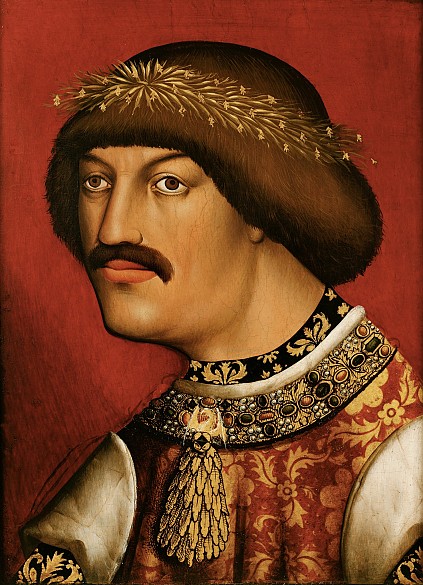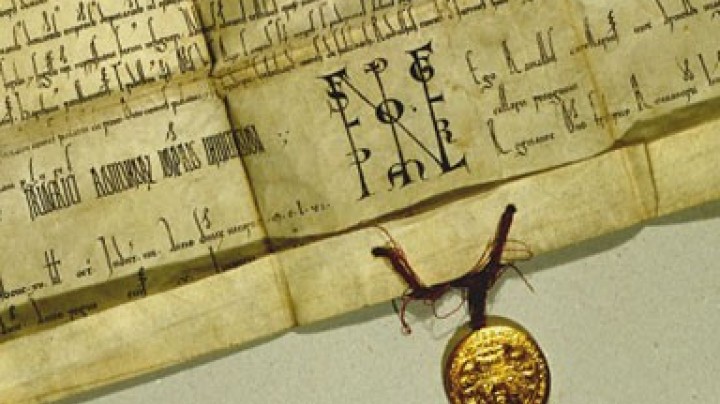Albrecht V: a turbulent reign
Albrecht’s reign spanned a time of unrest: the authority of the Roman Catholic Church had reached a nadir, and the tumult of the Hussite revolution in Bohemia was spilling over into his territories. Albrecht found convenient scapegoats in the Jews, on whom popular anger could be vented.
During Albrecht’s reign the Church was in a very grave situation, with the papal schism at its height. Since 1409 there had been three popes holding office, with the result that papal authority was diminishing and monarchs began to regulate the affairs of the Church as they saw fit.
Albrecht started a reform of the monasteries, concentrating on the Benedictines, the oldest and wealthiest institutional order in his lands. Starting out from the abbey at Melk, the founding idea of a monastic life lived in obedience and poverty was to be re-established. Begun under the supervision of the ruler in 1418, the Melk Reform led to a final flowering of monastic life and culture before its decline during the course of the Lutheran Reformation.
In neighbouring Bohemia the crisis in the Church led to an even greater erosion of ecclesiastical power. Radical demands for renewal in the Church as made by the Prague cleric and theologian Jan Hus fell on fertile soil. What had begun as a theological dispute became radicalized after Hus, who had been condemned as a heretic by the Council of Constance, was burnt at the stake in 1415. In 1419 a revolutionary popular uprising broke out in Prague which changed the situation completely.
Fuelled by nationalistic as well as religious motives, the movement soon split into various factions. The moderate Utraquist party found supporters among the nobility and urban middle classes. The more radical Taborites, who rejected any secular and clerical authorities, demanded the establishment of a theocratic state. Bohemia sank into anarchy. The power of the Church as well as that of the king was completely undermined. Wenceslas IV, who was in any case a weak monarch, died of a stroke when told of the revolt in Prague. His rival and half-brother Sigismund of Luxembourg, who had been Roman-German king since 1411, attempted to gain dominion over Bohemia by means of alliances with the neighbouring countries.
In continuation of his father’s policy, the Austrian duke Albrecht V belonged to Sigismund’s camp. In 1412, in his capacity as supreme head of the Holy Roman Empire, Sigismund had confirmed Albrecht’s sovereignty in Lower Austria after the turbulent declaration of his majority. To strengthen the existing alliance between Sigismund and the Albertine line, the teenaged Albrecht was promised the hand in marriage of Sigismund’s daughter Elizabeth, who was aged two at the time.
The alliance between Sigismund and Albrecht was affirmed in the Treaty of Pressburg in 1421. Albrecht pledged Sigismund his military support and in return the prospect of inheriting the crowns of Bohemia and Hungary if Sigismund died without male issue. To confirm the treaty Sigismund married his only daughter Elizabeth to Albrecht in 1422.
Albrecht supported Sigismund’s military actions against the Hussite uprising in Bohemia. In 1420 the emperor even proclaimed a crusade against what the Church saw as a heretical movement. An allied army consisting of imperial troops and units supplied by other electors, including Duke Albrecht, suffered repeated crushing defeats. Albrecht feared that Hussite ideas would spread to his dominions. In 1421 teachers and students at the University of Vienna were forced to swear that they would combat heretical doctrines.
The emperor’s punitive measures had the effect of escalating the conflict: in 1422 raiding Hussite troops crossed the border into Austria, plundering areas of northern Lower Austria. This was followed by several waves of fighting on both sides of the borders between Bohemia, Moravia and Austria which brought widespread destruction in their wake.
In reaction, Albrecht began to reorganize the defence of his lands. Among other measures Lower and Upper Austria were divided into Quarters in order to improve the coordination of defensive actions. These divisions still survive today as official regions.
One tragic consequence of this upheaval was the Gesera of 1420, the violent expulsion of all the Jews in Vienna and subsequently of all Austrian Jews. An explosive mixture of vague accusations and religiously motivated hatred together with the assertion that the Jews were supporting the Hussites was exploited by Albrecht to rid himself of the debts he had run up with the Jews in Vienna. On 23 May 1420 he gave orders to dissolve all the Jewish communities in Austria, take all Jews prisoner and confiscate their assets. In Vienna the situation escalated: mass executions, forced baptisms and looting destroyed the Jewish community that had been established there since the high Middle Ages.












